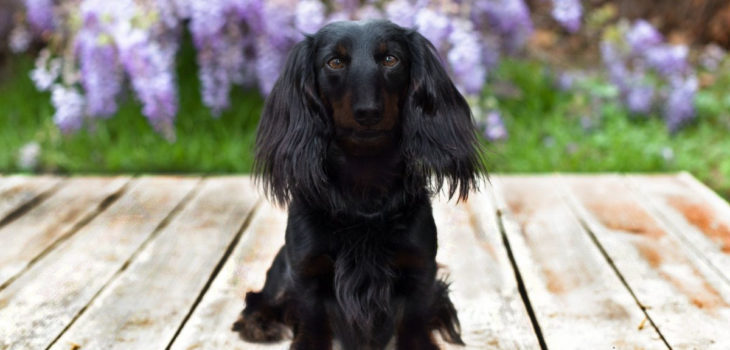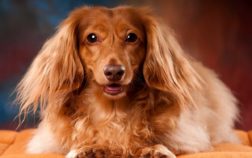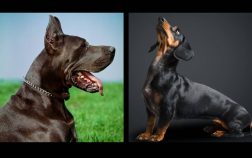Dachshunds come in dozens of different colors and patterns but few are as rare as the solid black long haired dachshund. Why is it so absurdly rare and what should you know about it? Are these dogs even officially recognized by the major kennel clubs out there? Are they as overly expensive as they sound like they’d be? And most importantly – are they as healthy as standard dachshund coat patterns and colors? Let’s discuss this below.
Why Is The Solid Black Long Haired Dachshund Rare?
The genetics behind the solid black dachshund can seem convoluted at first but are actually fairly simple. There really are just a couple of things to note.
Firstly, all of the dozens of differing dachshund colors and patterns are based on just two base colors – black and red. Black is determined by the presence of eumelanin and red – by pheomelanin. These two colors, however, as well as their shades and the way they mix are determined by a series of genes – that’s why we have tan, blue, grey, isabella, and various other dachshund colors, they are all based on red and black but with different shading, dilution, and so on.

In the case of full-black dachshunds – these are just dogs for which the pheomelanin (red) color has been “disabled” by multiple recessive genetic loci. Such loci include the B loci which is responsible for the color brown (a variation of the base color red), the E loci for the color red, and others.
In genetics, these loci (plural for locus) go in pairs so they can be “EE”, “Ee”, and “ee”, where the small letter indicates a recessive locus and the capital letter – a dominant locus.
In short, for a dachshund to be fully black, the loci pairs for all other pheomelanin(red)-based colors need to be “off”, meaning that they all need to be recessive “ee” rather than “EE” or “Ee”.
As you’d guess, that’s quite a rare occurrence as most dachshunds will have at least one color loci pair with a dominant locus in it. Not only is this rare but for this solid black color to be passed on, both dachshund parents need to be fully black as otherwise a dominant locus will be introduced in the new litter.
Can Solid Black Dachshunds Only Be Long Haired?
Solid black dachshunds can be either long haired or smooth (short) haired. They can’t be wire haired so you will always find at least a tinge of tan or red in black wire haired dachshunds.
Both short and long haired dachshunds are equally rare, however, and they tend to be priced the same (very highly). However, solid black long haired dachshund pups do seem to be researched more online for whatever reason.
Click Here for Info about:
How Expensive Are Solid Black Long Haired Dachshund Pups Really?
Very expensive. You’d be hard-pressed to find such a pup sold for less than $2,000. If you do, however, that might not be very good news either as it may indicate mass inbreeding on the side of the breeder. This harmful and unethical practice is often done by puppy mills and pet stores so you should always ask for health and hereditary certificates.
In fact, reputable breeders will let you see the whole litter and the parents in person. All this can bump up the pup’s price tag but is worth it for a healthy dog.
Do Solid Black Long Haired Dachshund Dogs Have Any Extra Health Issues Compared To Other Doxies?
They aren’t supposed to, at least not as far as their genetics are concerned. There isn’t anything in the genes of a solid black Doxie that’d make its health worse, so, just make sure that you get a properly bred dog.

Should I Get A Solid Black Dachshund?
If you can afford one and you make sure you’re working with an adequate breeder – sure. Even then some people may frown down upon you as breeding such rare coat types is intrinsically associated with the risk of inbreeding. In fact, all-black dachshunds aren’t even officially recognized by most kennel clubs such as the AKC for this very reason. Still, if you have the fund and make sure you’re getting a healthy pup, there’s nothing wrong with that.
FAQ’s
[rank_math_rich_snippet id=”s-994c6803-2504-485a-967f-4c0f4549a7e8″]





